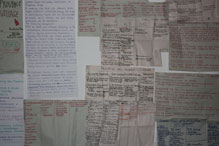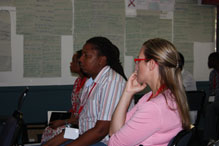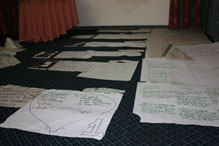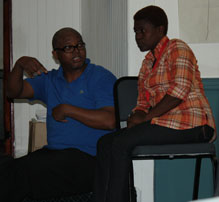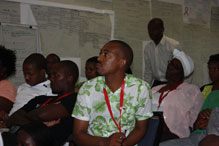
Nelson Mandela Foundation facilitators shared their experiences and challenges during the review and refinement process, which took place on Sunday and Monday
February 9, 2010 – In the village of Khakhala, on the outskirts of Giyani in the Limpopo Province, getting people in the community to use the free condoms from the local clinic is not the problem.
The problem is getting people to use those condoms correctly.
In Khakhala, school children take the condoms from the clinic and deliberately break them, to use as garters to hold their socks up. It’s funny, but in a village where the local facilitators estimate that around 50% of the local inhabitants are infected with HIV/AIDS, it’s also just one of the challenges contributing to the spread of the disease in the community.
In Khakhala, people fear disclosing their status or going for testing, because they believe that home-based community workers, and nurses from the local clinic, do not keep test results confidential.
As a result, there has been very little voluntary counselling and testing (VCT), but regular funerals for people aged between 12 and 35, suggest that there is a high prevalence of HIV/AIDS in the community.
This was the report from the Nelson Mandela Foundation-assisted community conversation team that operates in Khakhala, one of the 91 villages around Giyani in Limpopo. The report was presented at the refinement and review process that ended this year’s community conversations training, at the Garden Lodge outside Johannesburg.
The process, which makes up the last two days of this year’s seven-day Community Capacity Enhancement (CCE) training process, has two purposes. The first is to go over the CCE methodology to ensure that the facilitators, who will be going into the 11 communities in which the HIV/AIDS community conversations operate, are fully prepared. The second is to create a space in which the facilitation teams can provide feedback on the challenges they’ve faced during the last year, as well as their successes.
“The aim of these last two days is to refine the skills of the facilitators who have been working over the last two years,” explained the Foundation’s Head of the Dialogue Programme, Mothomang Diaho. “It’s critical that the methodology is not misinterpreted.
“This is also an opportunity to report back what they’ve learnt from their communities, which in turn provides everyone with an opportunity to learn from each other.
“On Thursday, during the training, the facilitators went through the Counting their Losses tool [which acknowledges those who have died of HIV/AIDS by placing symbols, including stones, flowers, and even photos for each loved one lost to the disease, on a mat at the front of the room] and one of the facilitators broke down completely. She had lost her sister and had never mourned her. It was an important lesson as this is what can happen during a community conversation.”
While Khakhala’s problem – schoolchildren using condoms as garters – may be unique; rape, substance abuse, transactional sex, intergenerational sex, crime, HIV-positive men and women deliberately infecting others, mistrust of the local clinic and an unwillingness to get tested are some of the challenges that nearly every one of the 11 communities around the country face.
The story is slightly different in each area, but the impact is the same. Without a change in the social practices in these and other areas in South Africa, HIV/AIDS will continue its march through those communities.
In each case, however, facilitators using the CCE methodology and CCE tools have got the community and local stakeholders to step in to address these challenges.
“These last two days have been a reflection and review of the work the facilitators have done, over the last year, in the communities they are in,” explained CCE Master Trainer Dolly Mphuthi. “We are looking at where we are coming from, and discussing the outputs and outcomes of the last year of work the facilitators have done in their communities.
“The facilitators walked us through their conversations, from March to December 2009. Then we did an analysis to see if there’s been a shift from where they started.
“This is the important work of accountability. We are accounting for the millions of rand that have gone into this project and we should be celebrating. The outcomes have been amazing!”
Mphuthi explained that in every instance there had been transformative shifts within individuals and in the communities in which the Nelson Mandela Foundation community conversations have operated.
Diaho agreed: “Yesterday, the teams who reported back said that there was a lot of movement and progress in terms of communities understanding how HIV/AIDS is transmitted, as well as understanding their role in that transmission and the support they need to offer.
“The tragedy, however, is that this process is only happening in pockets around the country. By all accounts, it would be a very useful response to the epidemic for this process to happen across the country. For communities around the country to reflect and build their own capacity is incredibly empowering.”
Fellow CCE Master Trainer Tom Mkhize explained that what they’re looking for during the review process are specific examples of significant changes to social practices and beliefs as a result of the CCE methodology and the tools.
“A moment I will never forget is when I was in Nigeria attending a similar review. An old woman from the community stood up during one of these review sessions. She held up a knife and said ‘For 33 years, I have been using this knife to cut umbilical cords without realising that I could have transferred the virus by using this knife’.”
As a traditional birth attendant’s tool, the knife, said Mkhize, represented a traditional way of doing things. The fact that her attitude towards the knife, and her role as a traditional birth attendant, had changed as a result of the community conversations in her area, indicated the kind of impact the conversations can and do have.
“Thank you for staying the course, for being with us for two years,” said Diaho. “I want to vocalise our thanks on behalf of the Nelson Mandela Foundation for being our ears, our hands in the community and demonstrating leadership, accountability and commitment.”
The 11 regions the community conversations operate in are: Mthatha, Kliptown, Soshanguve, Mhluzi, Galeshewe, Lerome, Lusikisiki, KwaMakhutha, Giyani, KwaLanga and Thaba Nchu.
